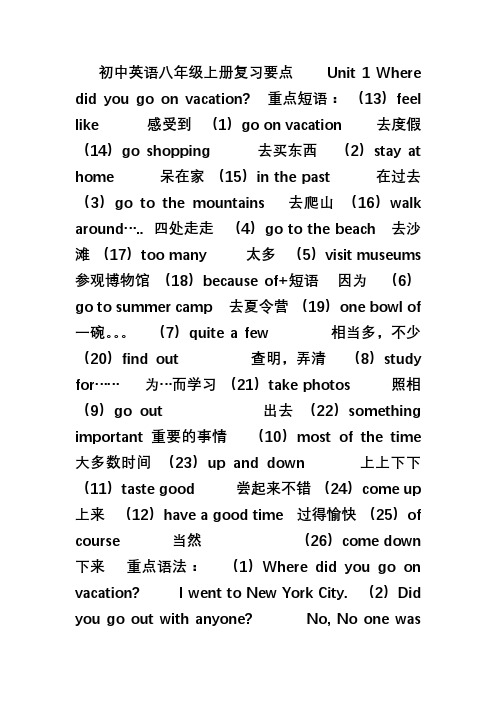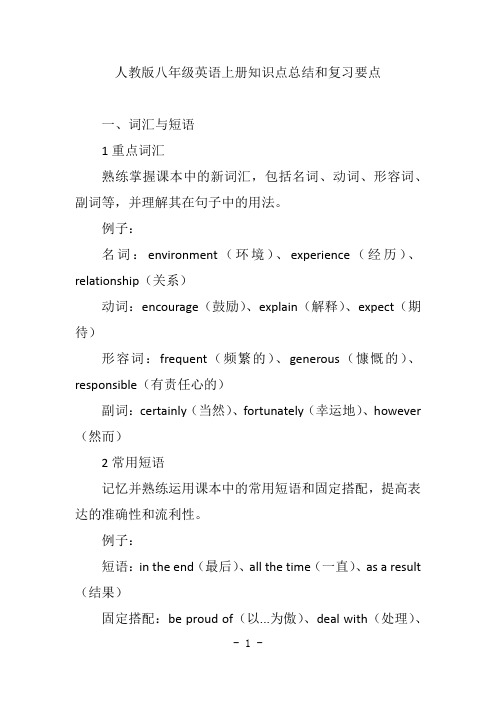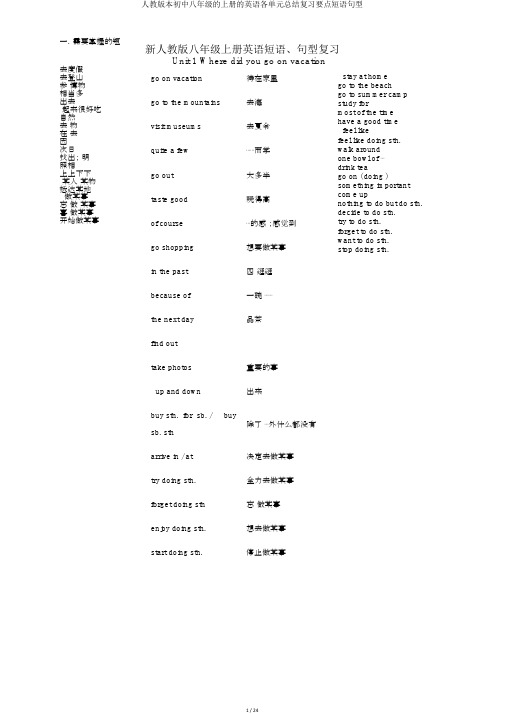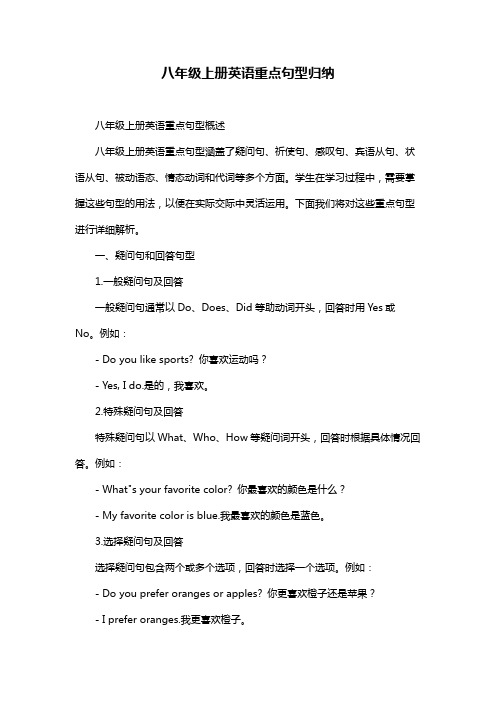2018-2019学年人教版八年级英语初二上册重点句型归纳整理
2018-2019学年人教版八年级英语上册全册知识点总结

2018-2019学年人教版八年级英语上册全册知识点总结Unit 1 Where did you go on n?本单元的话题是谈论假期活动内容,同时复一般过去时。
本单元的语法包括复一般过去时和研究不定代词和不定副词的用法。
不定代词和不定副词的用法包括以下几点:左边的some、any、every、no与右边的body、one、thing构成不定代词,而some、any、every、no与右边的疑问副词where构成不定副词。
一般情况下以some开头的不定代词和不定副词用于肯定句,以any开头的不定代词和不定副词用于否定句或疑问句。
以no开头的不定代词和不定副词则表示否定含义(no one为两个单词)。
当不定代词或不定副词和形容词连用时,形容词放在后面。
例如:He has XXX do.(他有重要的事情要做,肯定句用something,形容词important放后)Did you buy anything special?(你买了什么特别的东西吗?一般疑问句用anything,形容词special放后)Did you go anywhere interesting last month?(上个月你去了什么有趣的地方吗?一般疑问句用不定副词anywhere,形容词interesting放后)不定代词和不定副词做主语时,后面的动词用单数形式。
例如:Everyone is here today.(今天每个人都在这里)本单元的短语和知识点包括:go on n(去度假)、go to the mountains(上山/进山)、stay at home(呆在家)、go to the beach(去海滩)、visit museums(参观博物馆)、go to summer camp(去参观夏令营)、study for tests(为考试而研究/备考)、go out(出去)、quite a few(相当多/不少,后跟可数名词复数)、take photos(照相)、most of the time(大部分时间)、buy sth for sb = buy sb sth(为某人买某物)、taste good(尝起来很好)。
2018-2019学年人教版英语八年级上册全册知识要点短语句型语法讲解

初中英语八年级上册复习要点 Unit 1 Where didyou go on vacation? 重点短语:(13)feel like 感受到(1)go on vacation 去度假(14)go shopping 去买东西(2)stay at home 呆在家(15)in the past 在过去(3)go to the mountains 去爬山(16)walk around….. 四处走走(4)go to the beach 去沙滩(17)too many 太多(5)visit museums 参观博物馆(18)because of+短语因为(6)go to summer camp 去夏令营(19)one bowl of 一碗。
(7)quite afew 相当多,不少(20)find out 查明,弄清(8)study for…… 为…而学习(21)take photos 照相(9)go out 出去(22)something important 重要的事情(10)most of the time 大多数时间(23)up and down 上上下下(11)taste good 尝起来不错(24)come up 上来(12)have a good time 过得愉快(25)of course 当然(26)come down 下来重点语法:(1)Where did you go on vacation?I went to New York City. (2)Did you go out with anyone? No, No one was here. Everyone was on vacation. (3)Did you buy anything special? Yes, Ibought something for my father. (4)How was the food? Everything tasted really good. (5)Did everyone have a good time? Oh,yes. Everything was excellent. 习惯用法:(9)try one`s best to do sth尽力做某事(1)buy sth for sb./ buy sb. sth 为某人(10)enjoy doing sth. 喜欢做某事买某物(11)want to do sth. 想去做某事(2)taste + adj. 尝起来…… (12)start doing sth. 开始做某事(3)nothing ….but + V.(原形) (13)stop doing sth. 停止做某事除了…之外什么都没有 stop to do sth 停下来做某事(4)seem + (to be) + adj 看起来(14)look + adj 看起来(5). arrive in + 大地方(15)dislike doing sth. 不喜欢做某事 arrive at + 小地方到达某地(16)Why not do sth. 为什么不做…….(6) decide to do sth. 决定做某事呢?(7). try doing sth. 尝试做某事(17)so + adj + that + 从句如此…以(8)try to do sth. 尽力做某事至于 1 (18)tell sb. (not) to do sth. 告诉某人(20).forget to do sth. 忘记去做某事(不要)做某事(未做)forget doing sth 忘记做过某(19) keep doing sth. 继续做某事事(已做)词语辨析:1anywhere 与somewhere 两者都是不定副词。
人教版八年级英语上册知识点总结和复习要点

人教版八年级英语上册知识点总结和复习要点一、词汇与短语1重点词汇熟练掌握课本中的新词汇,包括名词、动词、形容词、副词等,并理解其在句子中的用法。
例子:名词:environment(环境)、experience(经历)、relationship(关系)动词:encourage(鼓励)、explain(解释)、expect(期待)形容词:frequent(频繁的)、generous(慷慨的)、responsible(有责任心的)副词:certainly(当然)、fortunately(幸运地)、however (然而)2常用短语记忆并熟练运用课本中的常用短语和固定搭配,提高表达的准确性和流利性。
例子:短语:in the end(最后)、all the time(一直)、as a result (结果)固定搭配:be proud of(以...为傲)、deal with(处理)、pay attention to(注意)二、句型与语法1基本句型熟练掌握五种基本句型,包括主语+谓语、主语+谓语+宾语、主语+谓语+间接宾语+直接宾语、主语+谓语+宾语+宾语补足语、主语+系动词+表语。
例子:主语+谓语:She sings.(她唱歌。
)主语+谓语+宾语:I like apples.(我喜欢苹果。
)主语+谓语+间接宾语+直接宾语:He gave me a book.(他给了我一本书。
)主语+谓语+宾语+宾语补足语:I found the book interesting.(我发现这本书很有趣。
)主语+系动词+表语:She is beautiful.(她很漂亮。
)2时态深入学习并掌握现在完成时、过去进行时、一般将来时、过去将来时等时态的用法和形式。
例子:现在完成时:I have already seen that movie.(我已经看过那部电影了。
)过去进行时:They were playing football when I called them.(我打电话给他们时,他们正在踢足球。
人教版八年级英语上册语法点总结(最全面)

八年级上册语法点总结Unit 1 How often do you exercise?Grammar: 特殊疑问句:wh-questions: what, who, where, when, which, whose, why, whom等。
特殊疑问句的构成及用法:1.结构:特殊疑问词+ 一般疑问句,即:特殊疑问词+be/助动词/情态动词+主语+谓语/表语(+其他)疑问代词:1) Who:谁。
做主语,用来指人Who is the boy under the tree?2)Whom 谁,做宾语,用来指人Whom are you writing to?3) Whose 谁的,用来指所属关系,如果做定语,一般后接名词Whose pen is this?4) Which 哪个,哪些,用来指对人或物在一定范围之内进行选择Which grils will in the sportsmeeting? Which pen is Lily’s?5)What什么,通常指物,也可指人,一般用在没有指出范围的情况下What can you see in thepicture? What are you doing now?疑问副词:1)When:何时,询问时间When will she come back?2)Where何地,询问地点,Where do you come from?3)Why为什么,询问原因,Why are you late for school?4)How 如何,询问手段、方式、工具以及程度等How do you usually go to school?5)How old多大,询问年龄,How old is Jim’s little brother?6)How many/much多少,询问数量How many birds are there in the tree?7)How far多远,询问距离,How far is it form your home to school?8)How long多长,多久,询问时间的长度或距离How long will you stay in Beijing?9)How often多长时间按一次,询问频率How often do you go to see your grandparents?10)How soon多久,询问时间How soon will you come back?频率副词:表示动作发生的频率,never, sometimes, often, usually, always.Unit 2 What’s the matter with you?Grammar:1. 用have 来描述身体不适have/have got a +疾病名字;得了……病2.情态动词should,情态动词should,can, may, must没有人称和时态的变化,后接动词原形Unit 3 What are you doing for vacation?Grammar:现在进行时表将来一般将来时表示将要做某事或计划打算做某事要用到句型“be+doing”其中be是助动词,它有人称和单复数的变化。
人教版本初中八年级的上册的英语各单元总结复习重点短语句型

一.需要掌握的短新人教版八年级上册英语短语、句型复习Unit 1 Where did you go on vacation去度假去登山参博物相当多出去起来很好吃自然去物在去因次日找出;明照相上上下下某人某物抵达某地做某事忘做某事喜做某事开始做某事go on vacation 待在家里go to the mountains 去海visit museums 去夏令quite a few ⋯⋯而学go out 大多半taste good 玩得高of course ⋯的感;感觉到go shopping 想要做某事in the past 四逛逛because of 一碗⋯⋯the next day 品茶find outtake photos 重要的事up and down 出来buy sth. for sb. / buysb. sth除了⋯外什么都没有arrive in / at 决定去做某事try doing sth. 全力去做某事forget doing sth 忘做某事enjoy doing sth. 想去做某事start doing sth. 停止做某事stay at homego to the beachgo to summer campstudy formost of the timehave a good timefeel likefeel like doing sth.walk aroundone bowl of ⋯drink teago on (doing )something importantcome upnothing to do but do sth.decide to do sth.try to do sth.forget to do sth.want to do sth.stop doing sth.不喜做某事dislike doing sth.什么不做⋯⋯呢Why not do. sth.告某人(不要)做tell sb. (not) to do sth. 某事二.需要掌握的句型1.你去哪儿度假我去了山里 .2.许久未。
初二英语上册知识点总结(人教版)

初二英语上册知识点总结(人教版)1. 语法知识点- 一般现在时:表示经常性或惯性的动作、状态或客观真理。
- 一般过去时:表示过去发生的动作或存在的状态。
- 现在进行时:表示现在正在进行的动作。
- 一般将来时:表示将来将要发生的动作或存在的状态。
- 定语从句:用来修饰名词或代词的从句。
- 状语从句:用来表示时间、地点、原因、条件或目的等的从句。
- 直接引语和间接引语的转换:将直接引语转化成间接引语需要考虑时态、人称、时间、地点等问题。
2. 词汇与短语- 常用动词短语:例如,look forward to, take part in, give up等。
- 时间短语:例如,in the morning, at night, on weekends等。
- 形容词与副词:例如,beautiful, quickly, slowly等。
- 连词与介词:例如,but, and, in, on等。
3. 句型结构- 主语 + 谓语:例如,Tom studies English.- 主语 + 不及物动词 + 状语:例如,He runs quickly.- 主语 + 系动词 + 表语:例如,She is beautiful.- 主语 + 及物动词 + 宾语:例如,I eat an apple.4. 阅读技巧- 理解词义:通过上下文判断单词的意思。
- 掌握关键信息:抓住文章中的重要信息。
- 推测逻辑关系:通过逻辑推理理解段落和篇章的结构。
- 注意细节问题:注意文章中的细节信息。
5. 听力技巧- 提前预测:在听对话或短文之前,先预测可能会涉及的内容。
- 注意语境:在听时将听到的语句与前后语境联系起来理解。
- 注意听力焦点:抓住关键词汇、数字和特别强调的内容。
以上是初二英语上册知识点的简单总结,希望对你有帮助!。
八年级英语(人教版)上册重点语法知识点

八年级上册重点语法知识点1. 感叹句:感叹句是用来表达喜怒哀乐等强烈情感的句子。
感叹句一般用how或者what开头,句末加感叹号。
what修饰名词,how修饰形容词或副词。
具体句式如下:(1)what引导的感叹句:1)What a(an)+形容词+可数名词的单数形式+主语+谓语!What a clever boy he is!多么聪明的小男孩啊!2)What+形容词+可数名词的复数形式+主语+谓语!What interesting books the children are reading! 孩子们读的书多么有趣啊!3)What+形容词+不可数名词+主语+谓语!What cold weather it is!多冷的天!(2)how引导的感叹句:1)How+形容词或副词+主语+谓语!How lovely the baby is!这孩子真可爱!(lovely为形容词)How fast he runs! 他跑地多快啊!(fast为副词)2)How+形容词+a(an)+可数名词的单数形式+主语+谓语!How heavy a box they are carrying! 他们抬的箱子多重啊!3)How+主语+谓语!How time flies! 时间过得多快!( ) 1. interesting job this is!A.WhatB.HowC.What anD.How an( ) 2. Mo Yan won the Nobel Prize for Literature last year. _______excellent he is!A. HowB. WhatC. What aD. What an( ) 3. ---______day it is!--- Let’s go out and enjoy the sunshine!A. What a lovelyB. How windyC. What a rainyD. How lovely( ) 4. ______ terrible weather we had last Sunday!A. WhatB. What aC.HowD. How a( ) 5. ______useful the book is! We can know well about the city from it.A. WhatB. What aC. HowD. What an( ) 6. _____great picture! Who painted it?A. HowB. WhatC. How aD. What a( ) 7. ______ a beautiful car! I’ve never seen it before.A. WhatB. WhichC.HowD.Whether2. How oftenhow often意为“多久一次”,常用于对时间频率的提问。
八年级上册英语重点句型归纳

八年级上册英语重点句型归纳八年级上册英语重点句型概述八年级上册英语重点句型涵盖了疑问句、祈使句、感叹句、宾语从句、状语从句、被动语态、情态动词和代词等多个方面。
学生在学习过程中,需要掌握这些句型的用法,以便在实际交际中灵活运用。
下面我们将对这些重点句型进行详细解析。
一、疑问句和回答句型1.一般疑问句及回答一般疑问句通常以Do、Does、Did等助动词开头,回答时用Yes或No。
例如:- Do you like sports? 你喜欢运动吗?- Yes, I do.是的,我喜欢。
2.特殊疑问句及回答特殊疑问句以What、Who、How等疑问词开头,回答时根据具体情况回答。
例如:- What"s your favorite color? 你最喜欢的颜色是什么?- My favorite color is blue.我最喜欢的颜色是蓝色。
3.选择疑问句及回答选择疑问句包含两个或多个选项,回答时选择一个选项。
例如:- Do you prefer oranges or apples? 你更喜欢橙子还是苹果?- I prefer oranges.我更喜欢橙子。
4.反意疑问句及回答反意疑问句由一个陈述句和一个简短的疑问句组成,回答时用Yes或No。
例如:- You finished your homework, didn"t you? 你完成了你的作业,对吗?- Yes,I did.是的,我完成了。
二、祈使句和感叹句1.祈使句的结构及用法祈使句表示命令、请求、建议等,结构为动词原形+其他成分。
例如:- Don"t talk loudly.不要大声说话。
2.感叹句的结构及用法感叹句表示惊讶、喜悦、愤怒等情感,结构为形容词+名词+主语+谓语。
例如:- What a beautiful day it is! 今天真是个好天气!后续内容将陆续为大家解析其他重点句型,帮助大家更好地掌握八年级上册英语知识。
- 1、下载文档前请自行甄别文档内容的完整性,平台不提供额外的编辑、内容补充、找答案等附加服务。
- 2、"仅部分预览"的文档,不可在线预览部分如存在完整性等问题,可反馈申请退款(可完整预览的文档不适用该条件!)。
- 3、如文档侵犯您的权益,请联系客服反馈,我们会尽快为您处理(人工客服工作时间:9:00-18:30)。
2018-2019 学年人教版初二英语上册重点句型归纳整理Unit 1 Where did you go on vacation?1.——Where did you go on vacation? ——I went to New York City. 你到哪里去度假了?我去了纽约城。
你出去带人吗? 不,没有人在这2.——Did you go out with anyone?——No, No one was here. Everyone was on vacation. 儿。
大家度去度假了。
3.——Did you buy anything special?你买了什么特别的东西吗? 对, 我给父亲买了一些东西。
——Yes, I bought something for my father. 4.——How was the food? 食物怎么样?——Everything tasted really good.每一样东西真的都好吃。
5.——Did everyone have a good time?大家玩的开心吗? ——Oh, yes. Everything was excellent.对,一切都很精彩。
6.There was nothing much to do in the evening but read. 晚上除了读书以外无事可做。
Unit 2 How often do you exercise?1.I go to the movies maybe once a month. 我可能一个月看一次电影。
2.——How often does he watch TV? 他多久看电视一次?——He hardly ever watches TV.他几乎不看电视。
3.——Do you go shopping? 你购物吗?——No, I never go shopping.不,我从来就不购物。
4.Here are the results. 下面就是结果。
5.We found that only fifteen percent of our students exercise every day. 我们发现仅仅百分之十五的学生每天锻炼。
6.We all know that many students often go online, we were surprised that ninety percent of them use the Internet every day. 我们都知道很多学生经常上网,我们很吃惊他们中有百分之九十的人每天上网。
7.Although many students like to watch sports, game shows are the most popular. 虽然很多学生喜欢看体育节目,但游戏节目依然是最受欢迎的。
8.It is good to relax by using the Internet or watching game shows, but we think the best way to relax is through exercise. 通过上网或看游戏节目来放松很好,但是我们认为最好的放松方法还是通过锻 炼。
9.It’s healthy for the mind and the body. 对思想和身体都很健康。
10.So start exercising before it’s too late! 开始锻炼,为时不晚。
Unit 3 I’m more outgoing than my sister.1.Sam has longer hair than Tom. = Sam’s hair is longer than Tom’ s. Sam 的头发比 Tom 的长。
2.I’m taller now than I was 2 years ago = I was shorter 2 years ago than I am now. 现在的我比两年前更高。
3.I study harder now than I did 2 years ago. 现在的我比两年前学习更努力了。
4.I studied harder 2 years ago than I do now. 两年前的我比现在学习更努力。
5.Who is smarter, your mother or your father? 谁更聪明,你的老爸还是老妈? 6.My mother told me a good friend is like a mirror. 妈妈告诉我好朋友像一面镜子。
7.That’s why I like reading books. 那就是我为什么喜欢读书。
8. I think friends are like books —— you don’t need a lot of them as long as they’re good. 我认为朋友像书,只要是好的就不必需要太多。
9.I’m shy so it’s not easy for me to make friends. 我很害羞,所以交朋友对于我来说不容易。
10.It’s not necessary to be the same. 没有必要一样。
11.I don’t really care if my friends are the same as me or different. 我不太关心朋友是否与我一样。
12. A true friend reaches for your hand and touches your heart. 真朋友在你需要是帮助你,打动你。
13.In fact, she’s funnier than anyone. 事实上,她比任何人都更幽默。
14.In what ways are you different? 你们在哪些方面不同? 15.Is he different from you in any way? 在某方面他与你不同吗? 16.She’s always there to listen. 她总是准备着倾听。
17.Huang Lei isn’t as good at tennis as Larry. Huang Lei 打网球不如 Larry。
Unit 4 What’s the best movie theater?1.The DJs choose songs the most carefully. 流行音乐节目主持人最认真的选择歌曲。
2.How do you like it so far? = What do you think of it so far? = How do you feel about it so far? 到目前为止,你认为它怎么样?3.Thanks for telling me. 多谢你告诉我。
4.Be up to you to do something 由你决定做…… 5.They play a role in deciding the winner. 他们在决定胜利者方面起着重要作用。
6.He is much better than other actors at finding the most interesting roles. 他在发现最有趣的角色方面比其他演员要擅长得多。
7. I still don’t really know my way around. 我依然不认得周边的路。
8.How far is it from your home? 从你家去有多远? 9.However, not everybody enjoys watching these shows. 然而,不是每个人都欣赏这些表演。
10.Some think that the lives of the performers are made up. 有的人认为那些表演都的生活经历是编造的。
11.However, if you don’ t take these shows too seriously, they are fun to watch. 然而,假如你不把这些表演看得太当真,它们还是值得看的。
12.And one great thing about them is that they give people a way to make their dreams come true. 有关它们的一件了不起的事情是, 它们给人们指明了一条让他们的梦想成真的道 路。
Unite 5 Do you want to a game show?1.Some people might ask how this cartoon animal became so popular. 有些人可能会问这个卡通动物怎样变得如此受欢迎了呢。
2.Mickey was like a common man, but he always tried to face any danger. Mickey. 象一个普通人,但是他总是努力面对任何危险。
3.Mickey was unlucky and had many problems such as losing his house or girlfriend. Mikey 是不幸的,总是面对很多问题,如失去房子或女朋友等。
4.However, he was always ready to try his best. 然而,他总是准备尽最大努力。
5.Most of them wanted to be like Mickey. 他们大多数都想象 Mickey 一样。
6.On November 18, 1978, Mickey became the first cartoon character to have a star on the Hollywood Walk of Fame. 1978 年 11 月 18 日,Mickey 成为在好莱坞星光大道上拥有一颗星星的第一 个卡通形象。
7.Today’s cartoons are usually not so simple as little Mickey Mouse, but everyone still knows and loves him. 今天的卡通通常都不如 Mickey Mouse 那样简单, 但是人人都知道他, 热爱他。
8.Who has a pair of ears more famous than Mickey’s? 谁有一双比 Mickey 的耳朵更闻名于世的呢? 9.I think those movies are so meaningless. 我认为那些电影如此地毫无意义。
